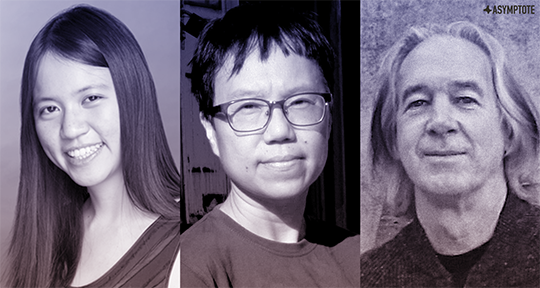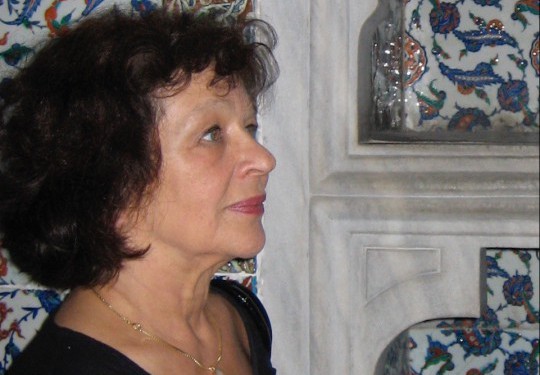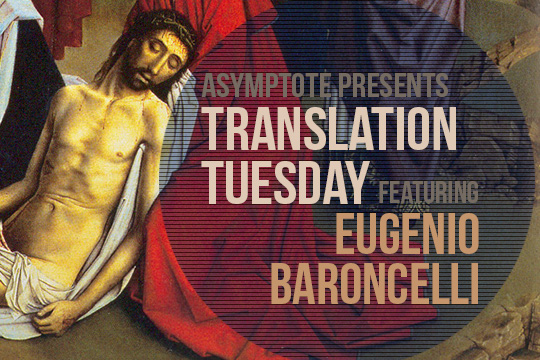In regards to each translator’s unique and inimitable performance of their craft, Chenxin Jiang and Steve Bradbury here take their own stab at translating the poems of Yau Ching, followed by a translation and interview in which they discuss their methodology, the particular challenges of the Chinese language, and the purpose of having multiple translations of a single work.
The work of Hong Kong writer and filmmaker Yau Ching ranges across mediums of cinema, criticism, and poetry to address themes of gender, sexuality, and colonialism, building a corpus that is as philosophically engaging as it is intimate and emotionally prismatic. In the five poems published as part of our Fall 2015 issue, Yau displays her capacity for creating surprising images with powerful social and personal resonances, bringing in prevalent crises of contemporary consciousness and political instability while suffusing the lines with a confessional edge: “I am my mom’s / exemplar of a beautiful life / this fills me with suspicion of myself and the world / that represents me.” A full bilingual collection of Yau’s poems, For now I am sitting here growing transparent, is forthcoming from Zephyr Press in the US and Balestier in the UK, translated with a particular instinct for playfulness and musicality by Chenxin Jiang. Here, Jiang and fellow translator Steve Bradbury—whom Jiang credits for introducing her to Yau’s writing—take their own distinct approaches at translating the poem “時空,” and in the interview that follows, they discuss the craft of working with poetry, as well as their differences and admirations for one another’s work. It’s curious to see the variance in the resulting translations, as well as the meanings that can be derived from their interstices and collisions, giving new insight to the hermeneutics of reading and the technicalities of language.
時空
時間如影在路
英文的思念叫長
我長—長——的想妳
垂下兩隻袖兩隻褲腳伸長手指腳指伸長
每一條頭髮與眉毛
拖在地上如根
一隻黑鳥飛過
細細的影子在樹
葉子散落一地中文的寂寞叫空
一張白白的稿紙
「喂,再來情詩三首!」
半透明沒一個影子
世界很大而我短短的
坐在這裏 愈坐愈透明
沒有文字可填滿
我四面八方的空
與前前後後的長Timespace
Translated by Steve Bradbury
Time is like a shadow along a road
The English word longing is called long
To long, I long, for you
My sleeves, pantlegs, fingers and toes lengthen
Each hair on my head and brow
Trails along the ground like mangrove roots
A black bird flits by
Thin shadows across the trees
Leaves littering the groundLoneliness in Chinese can be called kong
Empty, hollow, void, a blank
Sheet of very white writing paper
“Three more poems and make it snappy!”
A translucency that casts no shadow
The world is so large yet I am so short and brief
The more I sit here the more translucent I become
Without a word to fill the plenitude
Of kong all the compass round
Stretching before and afterSpacetime
Translated by Chenxin Jiang
Time is like a shadow cast on the road
The English word longing has length in it
I long—long——for you
My sleeves pant legs lengthen fingers and toes lengthen
every single hair on my head and brow
stretches downwards trailing on the ground like banyan roots
a black bird flies by
casting its slender shadow on the tree
Leaves scatterLoneliness in Chinese is empty
An empty sheet of lined paper
“Hey you, three more love poems!”
translucent it has no shadow
the world is big and for now I am
sitting here growing transparent
No words can fill up
how empty I am on all sides
and, in front and behind, how long




